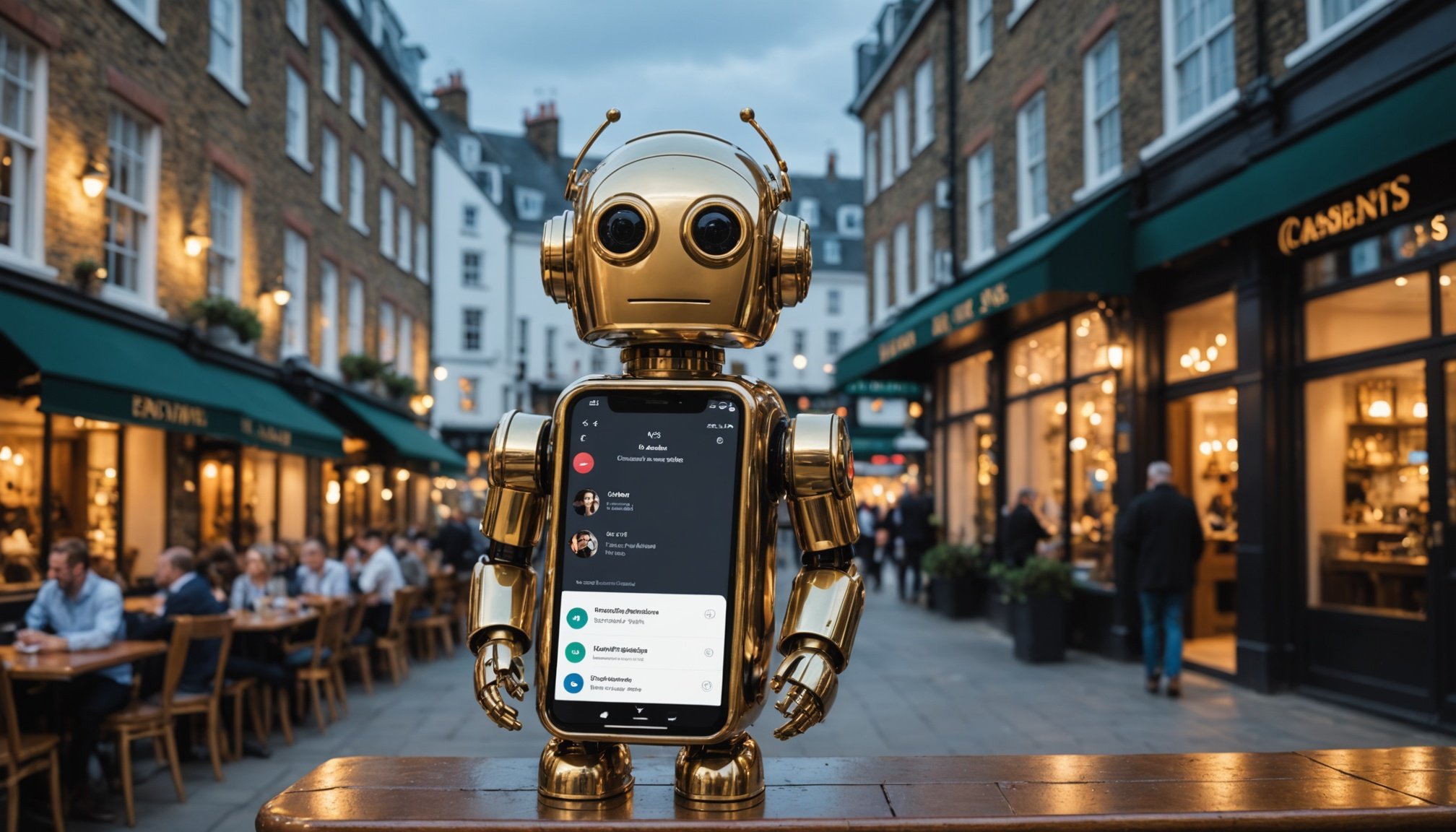Overview of AI-Powered Chatbots in Hospitality
AI chatbots have become a cornerstone in the UK hospitality industry, transforming how hotels interact with customers. These intelligent systems are designed to understand and respond to users, mimicking human conversation and enhancing the customer experience with remarkable precision.
In recent years, technology in hotels has advanced significantly, with AI chatbots evolving from basic query handlers to sophisticated assistants capable of managing bookings, providing local recommendations, and addressing customer service inquiries. This evolution underscores a broader trend in the sector, where technology’s rapid development is reshaping traditional service methods.
Have you seen this : Boosting Mobile Payment Security: Essential Strategies for Gig Economy Workers in the UK
To remain competitive, UK hospitality businesses are increasingly adopting AI chatbots. This tech-savvy move aligns with recent market trends that highlight a growing preference for instant and efficient customer support. As these AI chatbots integrate more seamlessly with existing hotel systems, they elevate guest experiences by offering personalized, round-the-clock service.
Conclusively, the role of AI in hospitality is pivotal. It not only meets the modern consumer’s expectations for immediate service but also provides valuable data insights into customer preferences. This dual capability positions AI chatbots as indispensable tools in the ongoing transformation of the hospitality landscape.
Also read : Boost attendee interaction: a comprehensive playbook for uk event planners to leverage ai advancements
Benefits of Implementing AI Chatbots
AI chatbots provide a multitude of advantages, particularly in the realm of enhanced customer service. One significant benefit is 24/7 customer support, ensuring that customer queries are addressed promptly at any time. This leads to reduced response times and enhances satisfaction by providing instant assistance without the need for human intervention. Moreover, chatbots can manage multiple inquiries simultaneously, a feat beyond human capability.
Additionally, the operational efficiency of businesses can see substantial improvement. Utilizing chatbots streamlines operations by handling routine inquiries and transactions, thereby reducing the staff workload. Employees can then focus on more complex and valuable tasks, increasing productivity and resource utilization.
A notable feature of chatbots is their ability to offer personalized interactions. By analyzing user data, these systems can tailor responses and engagement strategies to individual preferences, creating a more personal experience. This not only improves guest engagement but also fosters loyalty and trust among users.
In a nutshell, deploying chatbots can enhance service delivery, improve operational processes, and forge better customer relationships—demonstrating the transformative potential of this technology in business environments.
Best Practices for Deployment
Deploying chatbots successfully involves understanding how different deployment strategies influence outcomes. A critical first step is to assess operational needs. Before starting a chatbot implementation, identify the specific function the chatbot will serve within your organization. This involves setting clear goals that address user needs. Are you aiming to enhance customer service, automate routine tasks, or provide 24/7 support?
Once you know your objectives, choosing the right technology and platform becomes easier. Evaluate different platforms to find one that fits your infrastructure and offers the necessary features. Look for solutions that allow for easy integration with existing systems and processes, ensuring seamless operational flow.
A user-friendly design is essential in practical guidelines for deployment. Ensure your chatbot is intuitive, with a user interface that aligns with your brand and engages users effectively. Prioritizing a seamless experience will increase adoption rates and user satisfaction.
Remember, it’s not just about the technology; it’s about how well it aligns with the strategic needs of your business and the problems it solves. Following these, deployment can become an efficient and successful part of your toolkit.
Case Studies from UK Hospitality Sector
In the evolving landscape of the UK hospitality sector, success stories involving AI chatbots are capturing significant attention. These real-life examples provide insight into innovative applications, highlighting the benefits of intelligent automation within hotel operations.
Examination of AI Chatbot Implementations
Several hotels across the UK have successfully integrated AI chatbots to enhance guest experiences and streamline operations. Chatbots like these handle tasks from managing reservations to addressing guest inquiries. The adaptation of such technology frequently leads to increased efficiency and guest satisfaction.
Key Metrics of Performance and ROI
Hotels have reported notable improvements in key performance indicators (KPIs) post-implementation. Metrics such as response time and customer satisfaction scores typically see a considerable boost. Moreover, the adoption of AI chatbots often results in a favourable return on investment (ROI) by reducing operational costs and freeing up staff for more complex tasks.
Lessons Learned and Best Practices
Through these implementations, the industry has garnered valuable insights. Successful strategies include integrating chatbots with existing systems for seamless communication and continually updating the AI to understand guest needs better. These case studies underscore the importance of a proactive approach in training staff and maintaining a focus on guest-centric service enhancements. With these practical lessons, hotels are better positioned to leverage AI’s full potential.
Regulatory Considerations and Compliance
Implementing chatbots in the hospitality sector comes with its set of compliance issues, primarily focused on data protection. Understanding regulations such as the General Data Protection Regulation (GDPR) is crucial. GDPR governs data privacy, mandating strict guidelines for managing personal information.
In the hospitality industry, chatbots frequently handle sensitive data such as guest preferences, booking details, and payment information. To navigate GDPR and data privacy concerns, organizations must:
- Ensure a transparent data processing policy is in place, outlining how guest data will be collected, utilized, and stored.
- Implement stringent data security measures, including encryption and access controls.
- Obtain explicit consent from users before data collection, ensuring they are informed of their rights.
Beyond GDPR, ethical considerations are also pivotal. Strategies must be developed to ensure ethical use, such as minimizing data collection to essential information and providing clear options for users to opt-out of data processing. Adhering to these measures fosters trust and ensures compliance with overarching data protection laws.
Overcoming Challenges in Adoption
Adopting AI chatbots in various sectors, particularly hospitality, can present significant challenges. These include unique industry-specific issues that require careful consideration. For instance, the diverse needs of hospitality guests mean that chatbots must be versatile and highly interactive. Often, these bots face technological limitations that can hinder their performance, like difficulty in understanding accents or managing complex queries.
To combat these barriers, staff training becomes paramount. Personnel should be equipped not just to operate these systems, but also to troubleshoot and enhance them. Successful integration involves not just installation but ongoing support, ensuring bots remain effective and relevant.
Gaining user acceptance is another hurdle. Driving user adoption requires chatbots to offer clear benefits, such as improved service speed and efficiency. Informing users about these advantages through personalized demonstrations or trial periods can facilitate better adoption rates.
Strategies for sustaining user engagement include regularly updating chatbot features and ensuring data privacy and security. By fostering trust, users are more likely to embrace these technologies, allowing them to harness the full potential and value of AI chatbots in their respective fields.
Measuring Success and ROI
Understanding performance metrics is crucial for evaluating chatbot success, especially in the hospitality industry. Identifying key performance indicators (KPIs) helps in measuring chatbot effectiveness. Common KPIs include response accuracy, customer satisfaction, and resolution time. These metrics provide quantifiable insights into how well a chatbot is meeting its intended goals.
ROI analysis plays a pivotal role when assessing chatbot deployments in hospitality. This analysis not only considers cost savings but also evaluates improvements in customer experience and operational efficiencies. By comparing initial investments against these benefits, businesses can determine if their chatbot implementation is yielding positive returns.
Continuously improving chatbot performance requires diligent data analysis and feedback loops. These processes involve examining usage patterns, gathering customer feedback, and making iterative updates to the chatbot algorithms.
For instance, a hotel might analyze data on guest interactions to understand common queries and enhance the chatbot’s ability to address them. This proactive approach ensures the chatbot remains relevant and efficient, ultimately aiding in better ROI.
Implementing these practices ensures that chatbots not only serve current business needs but also adapt to future challenges. This strategic investment in AI-driven tools fortifies the hospitality sector’s growth.
Future Trends in AI Chatbots for Hospitality
As the future of technology unfolds, next-gen chatbots in the hospitality industry are expected to bring forth transformative advancements. One major trend is the use of advanced machine learning algorithms enabling chatbots to better understand and predict guest preferences. This will not only enhance personalisation but ensure seamless interaction, leading to a more satisfying customer experience.
The evolution of these chatbots will be significantly driven by changing customer preferences. Visitors increasingly desire instant, accurate assistance, making chatbots essential in handling routine queries swiftly. As preferences shift, chatbots will need to adapt, learning from each interaction to become increasingly proficient.
In terms of new applications, we might see AI chatbots aiding in multilingual communication, breaking language barriers for international guests. Another potential development could be their use in anticipating room service needs or personalising travel itineraries based on previous stays and gathered data. The hospitality industry will likely continue to focus on integrating these trends in hospitality to provide enhanced service while also streamlining operations.
These advancements hint at a future where human and AI collaboration is not just efficient, but essential for meeting and exceeding guest expectations.











